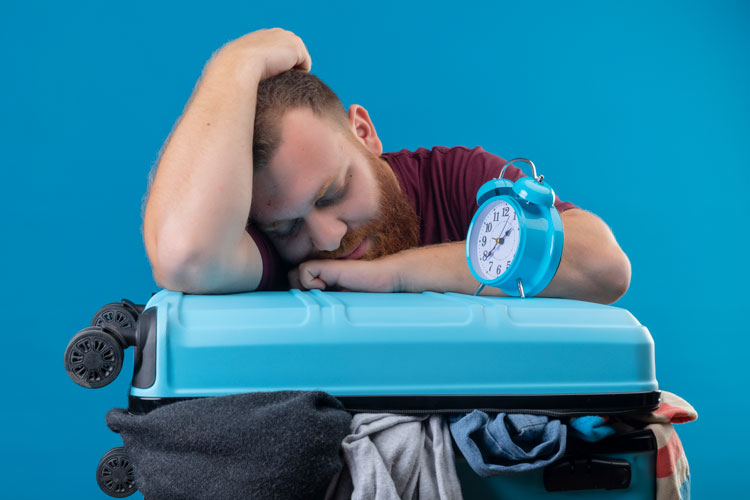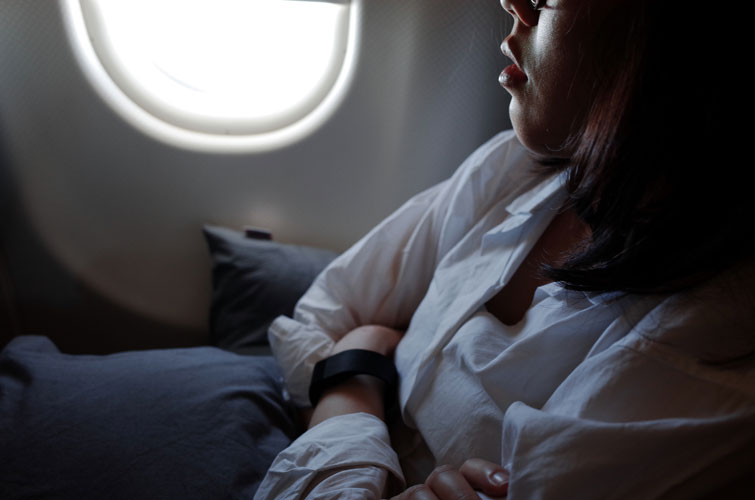How Jet Lag Impacts Hormones: Travel Tips and Recovery Strategies

Traveling long distances across numerous time zones can disrupt much more than your sleep schedule, it can interfere with your body’s internal clock and even impact essential hormone levels. If you experience jet lag frequently, you’re not just battling fatigue, you may also be affecting your long-term hormonal health.
Understanding the effects of jet lag and how to manage them can help protect your body’s circadian rhythm, improve your energy levels, and support optimal performance during and after travel.
What Is Jet Lag?
Jet lag is a temporary condition that results from a mismatch between your internal body clock and the local time at your destination. This mismatch is especially noticeable when traveling east or crossing several time zones. The more time zones crossed, the more likely you are to experience symptoms.
Symptoms of jet lag may include:
- Difficulty sleeping at night
- Daytime fatigue or sleepiness
- Mood changes or irritability
- General feeling of being unwell
- Digestive disturbances
- Impaired mental performance
Jet lag is classified under sleep disorders because it causes significant sleep disruption and impacts your ability to maintain normal wake patterns. It can last for a few days or even a few weeks, depending on how far you’ve traveled and how well you manage the recovery process.
How Jet Lag Affects Hormones
Your body’s circadian system is controlled by the brain’s hypothalamus and regulates hormone release patterns over a 24-hour cycle. This includes:
- Melatonin: helps regulate sleep and wake cycles
- Cortisol: supports alertness and stress response
- Insulin: affects metabolism and blood sugar control
- Thyroid hormones: regulate metabolism and energy
- Sex hormones: influence mood, sleep, and libido
When your internal clock is misaligned with the local time, the release of these hormones becomes mistimed, leading to symptoms like fatigue, sleep deprivation, mood swings, and reduced cognitive function.
Why Traveling East Feels Worse

Traveling east makes it harder for your circadian system to adjust because you’re shortening the day, requiring your body to fall asleep earlier. This disrupts the natural sleep-wake cycle and often makes jet lag worse than traveling west, which allows for a longer day and a more gradual shift in wake and sleep patterns.
How to Reduce Jet Lag and Support Hormone Balance
There is no one-size-fits-all method to prevent jet lag completely, but several strategies can help you reduce jet lag symptoms and manage travel fatigue effectively:
1. Shift Your Sleep Schedule Before You Fly
If possible, adjust your bedtime by 30 to 60 minutes in the days leading up to your trip. This helps your circadian clock begin to align with your destination, especially if you’re traveling east or across multiple time zones.
2. Get Natural Light Exposure
Natural light exposure is one of the most powerful tools to reset your circadian system. Get outdoors during daylight hours, especially in the early afternoon, to help your body adjust to the new schedule. This exposure helps suppress melatonin during the day and reinforces wakefulness.
3. Use Bright Light Strategically
Bright light therapy, using a light box, can trick your body into adjusting to a new time zone by shifting melatonin release. Using bright light in the morning after traveling east, or in the evening when traveling west, helps realign your human circadian system. Always use light therapy under the guidance of a healthcare provider to ensure safety and timing.
4. Use Melatonin Correctly
Taking melatonin, particularly exogenous melatonin in small doses, can help support the body’s natural transition to nighttime hours at your destination. This hormone, often used as a sleep aid, should be taken at your intended bedtime in the new time zone. Avoid taking melatonin too early or too often, as it can delay adjustment or even cause difficulty falling asleep if misused.
5. Avoid Sleeping Pills
Sleeping pills may provide temporary relief but often lead to grogginess, reduced quality sleep, and delayed circadian adaptation. Use them sparingly and only with medical advice. Instead, try using a sleep mask, earplugs, or relaxation techniques to help you fall asleep naturally.

6. Wake Up at the Local Time
Wake up at your target local time, even if you didn’t sleep well. This consistency helps reset your circadian clock and reduces the risk of extended daytime sleepiness or poor nighttime sleep. Outdoor light and light activity upon waking can further support adjustment.
7. Support Your Hormones After Travel
Jet lag affects not only melatonin and cortisol but also hormones involved in metabolism, digestion, and blood pressure regulation. Hormonal imbalance can linger if you travel frequently or recover poorly. Consider post-travel support that includes:
- Nutrient support for energy and hormone recovery
- Hydration and light physical activity
- A check-in with your provider if you experience prolonged fatigue or cognitive issues
What Research Shows

A recent review and consensus statement from sleep medicine experts highlights the importance of synchronizing your sleep-wake schedule with natural light, minimizing artificial light at night, and using strategic melatonin supplementation. These strategies have shown effectiveness in reducing the symptoms of jet lag and promoting faster recovery across time zones.
Support for Frequent Travelers at Tucson Wellness MD
At Tucson Wellness MD, we understand the hormonal effects of jet lag and how they can impact your overall well-being. Whether you travel occasionally or cross numerous time zones for work, we offer personalized strategies for overcoming jet lag and supporting your hormone health.
Our team can assist with:
- Hormone testing to assess circadian disruption
- Melatonin protocols tailored to your travel patterns
- Nutrition and supplement guidance for post-travel recovery
- Long-term wellness planning for sleep disorders and chronic fatigue
Travel Smarter with Hormone Support
Managing the effects of jet lag isn’t just about getting sleep, it’s about protecting your hormonal balance and supporting your body’s ability to function at its best. Whether you’re adjusting to a new time zone or trying to avoid jet lag on your next trip, a proactive approach can make all the difference.
Book your consultation with Tucson Wellness MD today to prepare your body for travel, improve sleep quality, and return home feeling better than ever.